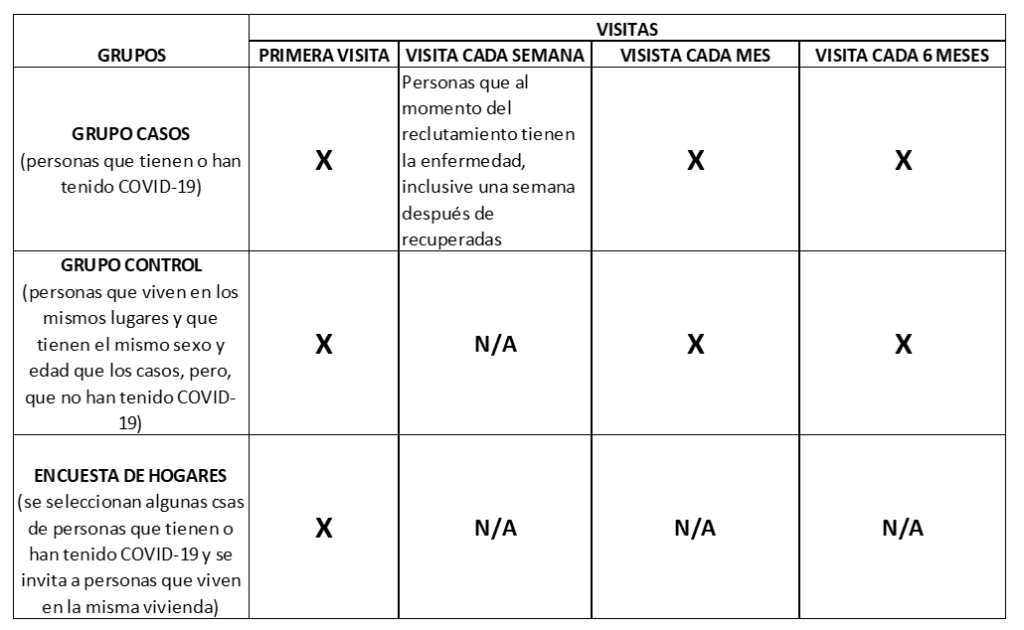FAQs RESPIRA STUDY
Questions Related COVID-19
They are an extensive family of viruses that can cause diseases in both animals and humans. In humans, it is known that various coronaviruses cause respiratory infections that can go from the common flu to more serious diseases. The coronavirus SARS-CoV-2 that was recently discovered causes the disease COVID-19.
COVID-19 is the most recently discovered infectious disease caused by the coronavirus. Both the new virus and the disease were unknown before December 2019.
The most common symptoms are:
- Fever
- Cough
- Tiredness
- Tos seca
- Pérdida del gusto y del olfato
Other less frequent symptoms are: nasal congestion, runny nose, sore throat, headache, diarrhea, red or irritated eyes, loss of taste and smell, skin rashes or general malaise. These symptoms are usually mild and come on gradually. Some people become infected but do not show any symptoms.
Serious symptoms such as shortness of breath or difficulty breathing, loss of speech or mobility, or confusion, and chest pain may also occur.
The majority of the people (about 80%) recover from the disease without the necessity of special treatment. Their own immune system (body defenses) manages to fight the virus and eliminate the disease. Su propio sistema inmune (defensas del cuerpo) logra combatir el virus y eliminar la enfermedad.
Approximately 20% (2 out of 10 people) who get COVID-19 develop severe illness with shortness of breath. People over the age of 60 are more likely to develop serious illness, as are those with conditions such as high blood pressure, heart problems, diabetes, obesity, cancer, or people with a history of smoking. About 2% of people who have contracted the disease have died. People with a fever greater than 38°C, a new-onset cough, and shortness of breath should seek medical attention.
A person can contract COVID-19 by coming into contact with respiratory droplets and particles exhaled by an infected person. These respiratory particles or droplets are expelled by coughing, sneezing, or speaking, singing, or whistling.
There are 3 main ways of spreading COVID-19: – Inhaling respiratory droplets and particles that contain the virus from being close to an infected person (less than 1.8 meters away). – By causing these droplets or particles to settle on the eyes, nose or mouth, especially through splashes and sprays produced by coughing or sneezing. – By touching your eyes, nose or mouth with hands contaminated with the virus. To avoid coming into contact with these droplets, it is recommended to maintain a distance of at least 2 meters from any person, the proper use of masks and hand washing.
Medidas de protección para todas las personas
Stay informed through public health authorities at the national and local level and endorsed health media (WHO, FDA, CDC, CCSS, MiSalud, etc.)
- Keep a minimum distance of 1.8 meters between you and anyone who does not live with you
- Wash your hands carefully and often use soap and water, as this kills any viruses that may be on your hands. If you cannot wash your hands, sanitize your hands using alcohol-based hand rubs.
- Avoid touching your eyes, nose and mouth, if it is necessary, wash or sanitize your hands first.
- Stay home if you are not feeling well and avoid contact with people who live with you until you can rule out COVID-19. If you have a fever, cough, and shortness of breath, seek medical attention. Follow the recommendations of the health authorities.
Antibiotics are not effective against virus infections, only against bacterial infections. COVID-19 is caused by a virus, so antibiotics do not work to treat or prevent infection. Antibiotics should only be used as indicated by a doctor.
Todos debemos preocuparnos por evitar el contagio de las personas más vulnerables a desarrollar un cuadro grave.
There is no specific medicine to prevent or treat COVID-19. However, those with a moderate or severe form of COVID-19 may require oxygen as part of their management, as well as medications that help reduce the inflammatory, respiratory, or systemic responses they present. Most patients recover with the help of supportive measures.
Hasta la fecha, no hay ninguna vacuna ni medicamento específico para prevenir o tratar la COVID-19. Sin embargo, los afectados deben recibir atención de salud para aliviar los síntomas. La mayoría de los pacientes se recuperan con la ayuda de medidas de apoyo
All COVID-19 vaccines are safe and effective in preventing the disease. In addition, they are effective in preventing severe cases and death from the variants of the virus that cause COVID-19. A small proportion of people with the full vaccination schedule (those more than 15 days after receiving the second dose) may become ill, but the infection is usually mild. In that case, by getting sick, you can pass the virus on to other people.
The “incubation period” is the time between infection with the virus and the appearance of symptoms of the disease. The majority estimates of the incubation period for COVID-19 range from 1 to 14 days, in most cases from 5 to 6 days.
Quarantine: means restricting activities or separating people who are not sick but may have been exposed to COVID-19. The goal is to prevent the spread of the disease by the time people start to have symptoms.
Isolation: consists of separating people who are sick with symptoms of COVID-19 and can infect others, this in order to prevent the spread of the disease.
Physical distancing: is being physically separated. It is recommended to maintain a distance of at least 2 meters away from others. This is a general measure that everyone should take even if they are well and have had no known exposure to COVID-19.
The most important thing to know about coronavirus contact with surfaces is that surfaces can be easily cleaned with common household disinfectants that will kill the virus. Various studies have shown that the COVID-19 virus can survive on surfaces from 2 hours to several days.
Questions related to RESPIRA study
This is the name given to the study: Evaluation of the immune response to SARS-CoV-2 in Costa Rica-RESPIRA.
This study lasts two years for a total of 24 visits (one per month)

Two years is enough time to assess whether the defenses are going to be maintained over time, and it also allows us to know if these defenses manage to prevent a second infection.
Some of the samples will be processed in Costa Rica, other samples will be sent to other laboratories abroad, because specialized technology is needed for the required tests.
These samples can be collected at home or at ACIB-FUNIN care centers, as chosen by each participant.
Detection of the virus in saliva samples is approved by the FDA and is used as a method in many countries. At the moment in this country, the CCSS is not determining the presence of the virus in this type of sample. Por el momento en el país la CCSS no está determinando la presencia del virus en este tipo de muestras.
There is no direct benefit from participating. But by participating people contribute to generate knowledge that could be applied in our health system. Participation in this study is completely voluntary and free.
ACIB-FUNIN does not provide direct medical care to people who participate in the studies we carry out, but in case of symptoms related to COVID 19, we will refer you to the CCSS
Within the protocol of the RESPIRA study, the use or application of vaccines is not contemplated, this is an observational study where no treatments are applied to the participants.
However, if study participants wish to receive a vaccine (whenever it becomes available), they may do so and it will not interfere with their participation in the study.
The RESPIRA study is for people who are invited and meet requirements such as: having a valid identity document, voluntarily expressing their desire to participate and through assessment, the study staff considers that they can participate.
People who are not invited, or guests who do not have a valid ID, people who do not sign the informed consent document after receiving study information, people who are not considered eligible by the study staff.
All the samples that we request in this study are voluntary and are only used for research purposes, they do not reflect any condition that may affect your state of health, for that reason we will not give individual results, but rather a general result of what we found at the end of the study. If the person wants the results of their tests, when they finish this study they can request them in writing principal investigator directly.
You can contact us at the ACIB-FUNIN telephone exchange 2668-1128.


